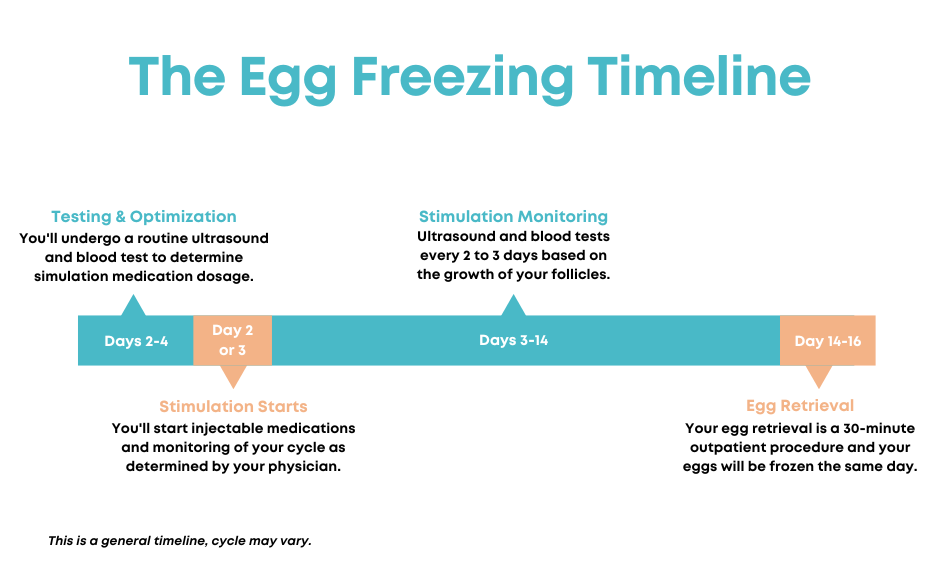What to Expect in the Egg Freezing Process

Southern California Reproductive Center is dedicated to providing all of the information you need about freezing your eggs to preserve your future fertility. In each step of your journey, SCRC is dedicated to ensuring your questions are answered.
The following will address one of the most common egg freezing questions (known medically as oocyte cryopreservation) we receive – What can I expect in the egg freezing process?
To begin, the fertility specialists at SCRC know that you are unique. Each person has their own medical profile and family planning goals. Your physician and clinical team will adjust the process to align with your body’s needs and to meet your family planning goals.

Phase 1: Testing and Optimization [Days 2-4]
Notification of Your Menstrual Flow
The first step in your egg freezing process is to contact your SCRC clinical team on the first day of your menstrual flow.
Initiating the Process
Your clinical team will schedule you to come to SCRC between days two and four of your menstrual cycle. We will take E2, FSH, and LH blood tests, as well as an ultrasound, to get a thorough look internally.
What is E2?
E2, or Estradiol, is a type of estrogen. The E2 blood test measures the level of estradiol in your system. The test is used to determine how well your ovaries are functioning.2
What is FSH?
FSH, or Follicle-stimulating hormone, is released by your pituitary gland, located underneath your brain. FSH helps manage your menstrual cycle and stimulates your ovaries to produce eggs. It also correlates with your ovarian reserve.
What is LH?
LH, or Luteinizing Hormone, is also made by the pituitary gland. LH helps control your menstrual cycle and triggers ovulation.3
What is an ultrasound?
An ultrasound enables us to count your egg follicles. Egg follicles comprise the fluid and cells that surround a maturing egg. This is another measurement of ovarian reserve and determines the best doses of fertility medication for you.
Birth Control
You will go on birth control for approximately 10-12 days. The time may vary depending on your physician and what your body may need. Birth control helps synchronize your follicles and may stop natural ovulation.
Monitoring
Once you have completed the birth control step, your clinical team will schedule you to come to the clinic for additional testing. Your physician may order additional tests as needed in addition to the E2 and an ultrasound.
Receiving your Medication
Your clinical team will order all injectable medications from the pharmacy for you and the pharmacy will deliver them to your door. You will receive a calendar that indicates when to take your injections. We will also provide you with video and written lessons on injecting the medication via our patient portal.
Phase 2: Stimulation Start [Days 2-3]
Beginning your Medication & Monitoring
Once you receive your fertility prescriptions, you will begin injecting the medications according to the calendar provided by your clinical team. You will also be responsible for monitoring your cycle. Depending on what your physician decides your body needs, your injection period will last approximately 10-14 days.
Your fertility medication will help grow all the follicles available on your ovary that month in a safe and controlled way. The frequent monitoring will allow your doctor to optimize your dose and protocol and tailor it to you.
During a natural ovulation cycle, you typically produce one egg. For egg freezing, it is essential to have the maximum number of eggs available for the highest quality outcome.
You will visit the clinic 3-5 times for monitoring during your injection period. Your clinical team will perform ultrasound monitoring and blood tests during this time to evaluate how your follicles are growing.
Phase 3: Stimulation Monitoring [Days 3-14]
Triggering
Once you have enough mature follicles ready to produce eggs, you are ready for your trigger shot. Your clinical team will perform ultrasound monitoring and blood tests to evaluate how your follicles are growing.
Phase 4: Egg Retrieval [Days 16 or 17]
Your clinical team will schedule you to come to the clinic for egg retrieval 35-36 hours after you inject your trigger shot. Egg retrieval is an outpatient procedure for which you will be lightly sedated.
During egg retrieval, your physician will use a transvaginal ultrasound probe to get a clear view of your ovaries. They will locate each follicle and retrieve the greatest number of eggs possible.
Your physician will gently insert a needle from your vagina into each ovary in turn and exert gentle suction to retrieve the fluid and the eggs from each follicle.
The egg retrieval procedure takes approximately 20-30 minutes. You can expect to be at the clinic from 2-3 hours total. You will feel no pain, and once you have been anesthetized, you will not remember anything until you have woken up safely in recovery. Anesthesia is necessary for both patient safety and physician accuracy. It helps to keep your body still so your physician can accurately target and recover all of your eggs.
Recovery for most is quick and easy. It is recommended you take a full day off to rest and have someone drive you to and from the clinic. Most commonly, women experience drowsiness or fatigue after the procedure due to the anesthesia.
Freezing
After we retrieve your eggs, they are transported carefully to our state-of-the-industry ART Reproduction Center Laboratory. Here our embryologists will meticulously count all eggs retrieved and select the most mature and viable eggs.
The lab will then remove the protective layer of cells surrounding each egg and use vitrification, or flash-freezing, to freeze the eggs in sub-zero temperatures. This technique prevents icicle formation in the cytoplasm of the egg. Your eggs will be kept in a special storage facility until you choose it is time for them to be utilized.
Post-Retrieval Testing
Depending on your physicians’ orders, you may have another E2 test and ultrasound during the week after your retrieval as a post-operative check.
Latest Technology, Individualized Care
At Southern California Reproductive Center, the latest in biomedical technology is utilized to support you in preserving your fertility. Our physicians create trust and a strong relationship with all patients. We strongly believe each person who comes to us deserves the highest levels of respect and compassion on their fertility journey.
To get started with egg freezing, contact us today to schedule your consultation.
Sources:
- Medline Plus: https://medlineplus.gov/ency/article/003710.htm
- Medline Plus: https://medlineplus.gov/ency/article/003711.htm
- Medline Plus: https://medlineplus.gov/lab-tests/luteinizing-hormone-lh-levels-test/

